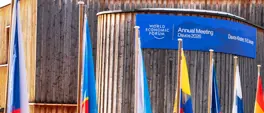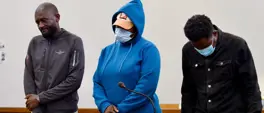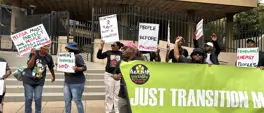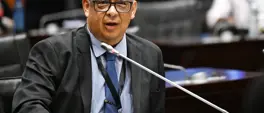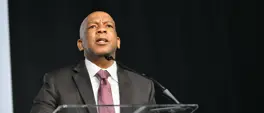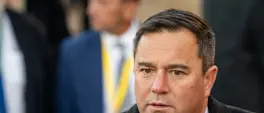JAMIL F. KHAN | The age of no neutrality: Why celebrities can no longer sit out human rights crises
Jamil F. Khan
21 November 2025 | 9:39"If people spend their money on celebrity products, they want to know that, when needed, those celebrities will advance human causes by using their power, influence and wealth in favour of their supporters."

US actress Sydney Sweeney. Photo:VALERIE MACON / AFP
While there are still not enough people standing on the side of humanity across the political spectrum, general awareness of structural oppression has certainly grown.
The genocide of Palestinians by Israel, and how it connects to the genocides in Congo and Sudan, has ruptured the façade of a post-colonisation world.
This moment has raised questions about our political allegiances, our consumption habits, our social institutions, and our collective humanity.
The questions raised here have also opened conversations about our investment in figures like international celebrities, and their role in shaping norms and values through their visibility and immense wealth.
While some feel that celebrities have no responsibility to engage with politics, many believe that their platforms must be used for the good of humanity in times of crisis.
During previous crises of humanity, such as apartheid, the impact of the arts and artists in resisting and shifting economic systems of oppression was clear to see.
Artists, entertainers and thinkers have a responsibilityto honestly reflect the times and hold up a mirror to society.
During moments of atrocity, their public platforms must be harnessed as a public good for keeping sentiment aligned with humanity.
In light of these growing expectations that artists should not advance oppressive systems, Euphoria actress Sydney Sweeney recently came under fire for her appearance in an American Eagle Outfitters advertisement titled “Sydney Sweeney Has Great Jeans.”
The obvious wordplay on “genes” drew criticism from audiences noting the danger of referencing genetic superiority, particularly while making a blonde-haired, blue-eyed white woman the face of it. When recently asked if she would like to denounce the white supremacist discourse the campaign legitimised, she declined.
Similarly, a recent interview with British actress Keira Knightley revealed her latest collaboration on a Harry Potter project. When asked about aligning herself with the franchise’s creator, J.K. Rowling, who is actively investing in harming transgender people, she claimed not to know much about it, remained dismissive of the criticism, and offered a platitude about “getting along,” much to the disappointment of her fans.
While many still debate the “complications” of denouncing oppression, it is clear that the time for fence-sitting on matters of human rights is over.
It is not only the concern of ordinary people or governments; everyone is implicated in the making of a world that disregards humanity. Additionally, we are recognising that in this highly unequal world, when you have more, you can and must do more.
Celebrities, particularly in the USA and Europe, who have been able to amass global followings, are seen to owe their wealth and success to the people who put them there.
Therefore, in times of atrocity, that wealth is expected to work for the survival of people.
Today, celebrities are not simply entertainers, but also businesspeople whose already excessive wealth is further augmented by people who religiously consume their products and, by implication, their social presence.
It is no longer enough for people to leave celebrities out of conversations about collective liberation.
If people spend their money on celebrity products, they want to knowthat, when needed, those celebrities will advance human causes by using their power, influence and wealth in favour of their supporters.
As a result of these conversations, many more people are being exposed, however begrudgingly, to social justice discourse, even if they fight against it.
Celebrity culture poses many problems, but it is currently at its most aggressive. With social media allowing people to feel much closer to celebrities, and reality TV quite literally inviting audiences into their living rooms, celebrity obsession has become deeply personal, making critique feel like an attack.
However, the public discourse on accountability has already spilled over into the realm of celebrity culture. Those who recall the role of the arts in resisting oppression refuse to exempt celebrities from responsibility, noting that their influence can shape public sentiment, while their wealth gives them access to institutions capable of effecting major change.
Celebrities who have previouslyengaged with social justice themes in their work now face an added responsibility to prove that they care about justice even when it is not profitable.
While it is unfortunate that this remains a debate, the expanding reach of awareness across many spheres sends a clear message: nobody is exempt from the responsibility to fight for a more equal and just world.
When we benefit from being in community with humanity, we must show up for the good of that community. Individualistic approaches to life, underpinned by capitalist logics of extraction, are no longer sufficient, as we see how easily the veneer of connection cracks in times of crisis.
As we grapple with this shameful period in our history, we must understand that it has revealed things we cannot unsee. If ever there was a time to reconstruct our value systems and build a better social contract, it is now.
At our most generous, three years of constant streams of information about human atrocities across the world is more than enough time to know what we shouldall know: “If you are neutral in situations of injustice, you have chosen the side of the oppressor.”
That quote by Archbishop Desmond Tutu instructs us to relinquish the mental gymnastics we often engage in to deny or delay truths that are obvious. There are no two sides to oppression.
History has taught us that ignorance and indifference are accomplices to oppression, and those who turn their faces away will also have to answer for their actions. The world we want is not possible if we keep shifting responsibility to someone else.
While knowing what to do can be difficult, we can start with knowing: knowing what we are dealing with, interrogating our investments in products and people, and evaluating whether who and what we consume advances or sabotages the cause of building a more just world. We can no longer claim ignorance.
Dr Jamil F. Khan is an award-winning author, doctoral critical diversity scholar and research fellow at the Johannesburg Institute for Advanced Study.
Get the whole picture 💡
Take a look at the topic timeline for all related articles.

